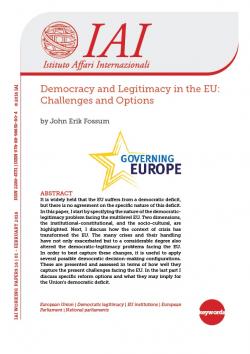Democracy and Legitimacy in the EU: Challenges and Options
It is widely held that the EU suffers from a democratic deficit, but there is no agreement on the specific nature of this deficit. In this paper, I start by specifying the nature of the democratic-legitimacy problem facing the multilevel EU. Two dimensions, the institutional-constitutional, and the socio-cultural, are highlighted. Next, I discuss how the context of crisis has transformed the EU. The many crises and their handling have not only exacerbated but to a considerable degree also altered the democratic-legitimacy problems facing the EU. In order to best capture these changes, it is useful to apply several possible democratic decision-making configurations. These are presented and assessed in terms of how well they capture the present challenges facing the EU. In the last part I discuss specific reform options and what they may imply for the Union’s democratic deficit.
Paper prepared within the context of “Governing Europe”, a joint project led by the Istituto Affari Internazionali (IAI) and Centro Studi sul Federalismo (CSF) of Turin in the framework of the strategic partnership with Compagnia di San Paolo, International Affairs Programme. Publ. in: Lorenzo Vai, Pier Domenico Tortola, Nicoletta Pirozzi (eds.), Governing Europe. How to Make the EU More Efficient and Democratic, Bruxelles [etc], P.I.E-Peter Lang, 2017, 248 p. (Federalism ; 8), ISBN 978-2-8076-0058-4 (pbk); 978-2-8076-0059-1 (pdf); 978-2-8076-0060-7 (EPUB); DOI: 10.3726/b10699.
-
Details
Roma, IAI, February 2016, 18 p. -
Issue
16|01 -
ISBN/ISSN/DOI:
978-88-98650-80-4
Introduction
1. What is the EU’s democratic problem: Is it unfit, inadequate, or distortive?
2. The crisis – A transformed EU?
3. Possible democratic decision-making configurations
4. What are the options?
Concluding comments
References
Topic
Tag
Related content
-
Ricerca27/01/2015
Governing Europe
leggi tutto



